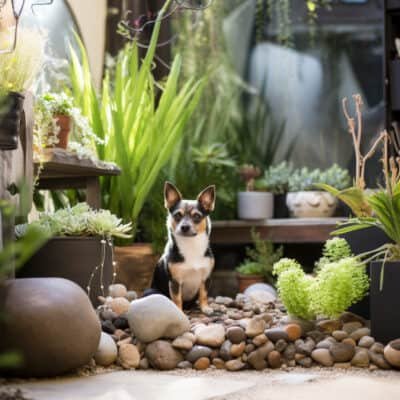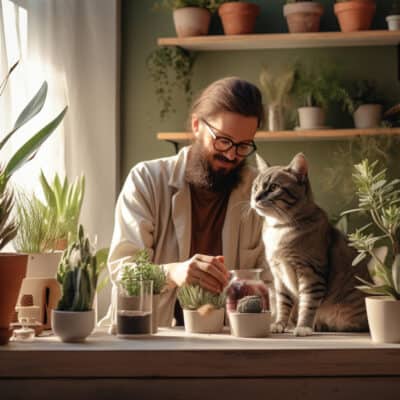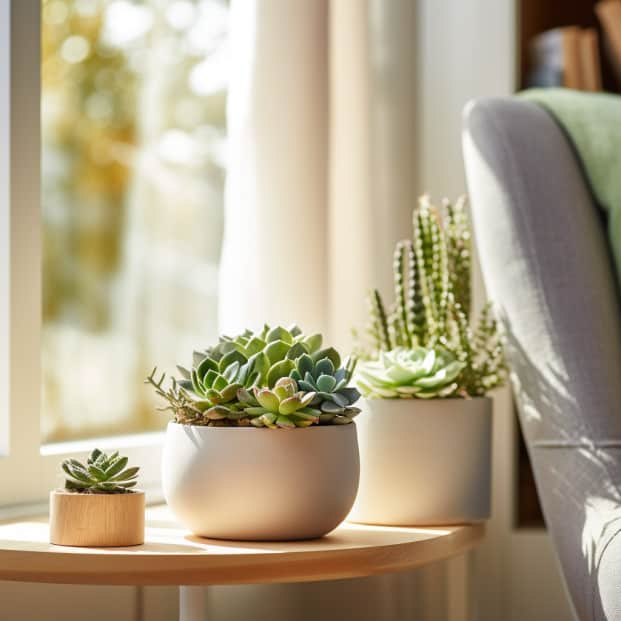Succulents are all the rage as indoor plants, but are they safe for our furry friends? As a long-time succulent collector and cat owner, I’ve learned that some succulents can be toxic to pets.
While most are harmless, there are a few varieties that can cause vomiting, diarrhea, and even liver damage if ingested.
Before decorating your home with trendy succulents, it’s crucial to know which ones to keep out of paws’ reach.
In this guide, I’ll share common succulents that are poisonous for cats and dogs so you can avoid bringing home harmful plants.
Knowing these dangerous varieties will let you safely enjoy succulents with pets.
KEY TAKEAWAY
Are succulents safe for cats and dogs?
Succulents can be toxic to cats and dogs, causing various symptoms such as vomiting and lethargy.
Pet owners should choose pet-safe plants and keep potentially harmful succulents out of reach to ensure the well-being of their furry companions.
Are Succulents Poisonous For Cats And Dogs?
The good news is most succulents are totally safe and non-toxic for cats and dogs. But there are a few varieties that can cause vomiting, diarrhea, and other issues if eaten.
According to the ASPCA, ingesting toxic succulents leads to major discomfort even if not deadly.
Some key toxic varieties to watch out for are:
- Jade plants: Ingesting any part of these popular Crassula succulents can irritate the mouth and intestine. (1)
- Euphorbias: Skin and sap from Euphorbia trigona and others can cause vomiting, diarrhea, and liver damage.
- Kalanchoes: These pretty succulents can cause stomach issues.
- Snake plants: Also called mother-in-law’s tongue, these have toxins that can cause nausea and vomiting.
- Aloe vera: Eating this common succulent can give cats or dogs vomiting and diarrhea.
- Cacti: Spines and toxins make cacti harmful if eaten.
Even “non-toxic” plants can cause mild tummy troubles. It’s smart to keep a list of scientific names for your indoor plants.
When deciding whether to grow potentially toxic succulents, consider your pet’s personality. Pets likely won’t munch on houseplants, especially unappealing succulents. But rambunctious pets can still knock over delicate plants.
It’s safest to keep toxin-producing succulents completely out of paws’ reach. Use hanging planters or high shelves for harmful varieties.
Choose pet-safe succulents for spots they can access. With some care, you can safely enjoy succulents alongside furry friends.
Succulents That Are Toxic To Cats And Dogs
Genus Crassula
This genus includes the popular jade plant. Most varieties are non-toxic but animals experience tummy troubles if large quantities are eaten. Ensure jade and similar Crassula are out of puppy and kitty menus.
Genus Euphorbia
You may know this type as crown of thorns, poinsettia or snow on the mountain. Their bright colors draw pets in but many kinds contain a nasty sap that causes lip and mouth swelling if licked. Keep well away!
Genus Kalanchoe
Such as mother of thousands, these beauties have a bad reputation for toxicity to fur kids. Their tiny plantlets offer extra temptation that could spell trouble if nibbled more than a taste. Love them from a distance!
Genus Sansevieria
Commonly called snake plant or mother-in-law’s tongue, nearly all types produce a vomit or diarrhea reaction if eaten. Very few cases end tragically however some kitties experience more irritation. This is best is kept out of paws’ path.
Genus Aloe
Most aloe varieties are safe in small doses used externally. However ingesting pieces upsets tums. These succulents are lovely decor, just stow away from fuzzy, friendly nibblers.
Cacti
While appearances are tempting to pets, most cacti contain painful needles and sap toxic when bitten. They should never be pet playthings. Always provide safer chew toys instead.
Types of Succulents Toxic and Safe for Cats
| Toxic to Cats | Safe for Cats |
| Mother of millions | Jade plant |
| Crown of thorns | String of pearls |
| Pencil cactus | Hens and chicks |
Symptoms of Succulent Toxicity in Pets
Eating certain succulents can cause our furry companions to get really sick. Some common signs that fidos or kitkats may have nibbled on a toxic succulent include:
- Vomiting
- Diarrhea
- Acting tired and unenergetic
Other signs can be drooling, trouble swallowing, or having an upset stomach. Some pets may even lose their appetite if a poisonous succulent was eaten. Keep an eye on your pets closely if you think they got into one of these plants.
What to do if a Succulent was Eaten

If you even think your pet may have gotten to a succulent, it’s important to take action right away. Call the veterinarian or ASPCA animal poison control center and let them know what type of plant was possibly ingested.
Bring any remaining pieces of the plant with you to show the vet for identification purposes. This can help them treat symptoms properly.
Oftentimes, furry friends just need to be monitored after eating small amounts. But some succulents like euphorbia tirucalli or christmas cactus are very toxic and medical attention may be needed.
If you have a pet that is particularly curious about your succulents, you may want to use a repellent spray. These sprays can be used to deter pets from chewing on succulents, and they are safe for both plants and pets.
Prices pulled from the Amazon Product Advertising API on:
Product prices and availability are accurate as of the date/time indicated and are subject to change. Any price and availability information displayed on [relevant Amazon Site(s), as applicable] at the time of purchase will apply to the purchase of this product.
Variations in Toxicity
The specific part of the succulent eaten can also affect how your pet feels. Things like sap, spines, or seeds sometimes contain higher levels of harmful compounds.
For instance, most of a prickly pear plants are non-toxic. Yet some dogs have experienced mouth irritation after biting into the spiny pads or fruits.
On the other hand, leaves and stems are usually less potent. So keeping intact succulents pet friendly and out of chewing range helps avoid any potential bellyaches.
Be aware though, even plants marked safe like some crassula varieties can cause minor skin irritation if a large amount contacts fur or paws. Play it safe and give succulents plenty of space from curious pet noses.
Differences Between Indoor and Outdoor Succulents

Succulents located inside the home are usually easier to keep away from wandering paws. But outdoor plants pose more of a challenge since curious companions have access to wandering gardens.
Some drought tolerant succulents commonly spotted outside include ponytail palm, hens and chicks, zebra haworthia, and chinese money plant.
While their fleshy leaves are very pet friendly, outdoor pots are more at risk for spillage. Pets may also chew on other garden items like rocks or soils. So be watchful of nibbling when outside playing.
Monitoring Pets After Possible Exposure
If consumption is suspected, pay close attention to any symptoms. Look for things like vomiting, tummy troubles, low energy, or odd behaviors.
Contact the vet promptly about concerning signs or large munches of toxic varieties such as beaucarnea recurvata, kalanchoe tomentosa or euphorbia milii.
Most pets don’t show effects from accidental tastes but medics need to know to provide the best treatment.
Even small exposures are worth a call to the vet or animal poison control line for guidance. It helps for your furry family member’s safety to watch carefully after any potential ingestions occur. Always make your home safe for dogs and cats around possible hazards.
Keeping Succulents Safe Around Pets
Cats and birds can be tricky when it comes to keeping succulent plants out of their reach. Some succulents are poisonous and could make your pets sick.
But with some precautions, you can still enjoy your succulent garden without worry.
Pets like cats are pretty curious. They may try to nibble on your jade plant or aloe vera if they can reach it.
Hanging planters are a good option since cats can’t jump that high. You can hang them from a hook in the ceiling, as long as they aren’t close enough for a daring feline to swat at.
Prices pulled from the Amazon Product Advertising API on:
Product prices and availability are accurate as of the date/time indicated and are subject to change. Any price and availability information displayed on [relevant Amazon Site(s), as applicable] at the time of purchase will apply to the purchase of this product.
You’ll also want to watch out for shelves. Cats love to jump up and see what they can knock over.
Keep any shelves full of succulents higher than your cat can jump from the floor or other furniture.
Another choice is putting succulents you know are toxic to pets in a room the animals can’t access. That could be a spare bedroom the cats don’t go in or the basement if you have pets like dogs.
For parrot owners, only display safe for cats and dogs succulents where birds can reach.
Otherwise they may nibble the string of pearls or pencil cactus and get sick from the unfriendly spines.
Succulents toxic succulents like the crown of thorns stay in the greenhouse.
Most popular succulents like the crassula ovata are not harmful.
But some succulents are toxic varieties that can cause vomiting and diarrhea if eaten. It’s best to be safe and keep those types out of chewing range!
With some simple adjustments, you can prevent accidents and keep your curious critters happy and healthy while still enjoying your greenery.
Low maintenance succulents make terrific indoor plants for pet owners. Just take the proper steps to succulent-proof for your furry or feathered friends.
Frequently Asked Questions
Is ingesting a large quantity of snake plant harmful?
While snake plant or sansevieria trifasciata is considered non-toxic in small amounts, ingesting a large quantity may cause vomiting or diarrhea in pets.
It’s best to keep this and other succulents out of reach of cats or dogs to avoid any potential upset.
What parts of succulents pose the greatest risks?
Certain parts of succulents like sap, thorns or spines may contain higher levels of irritating calcium oxalate crystals and other compounds.
Seeds also carry risks in some species.
In general, intact leaves and stems are less potent if consumed, but all plant parts should be inaccessible.
How do I identify poisonous succulents for pets?
Some common succulents known to be toxic for cats or dogs include burro’s tail, panda plant, senecio rowleyanus and certain types or parts of crassula arborescens.
Checking with the pet poison helpline or consulting lists of pet-safe succulents can help determine which to avoid or use caution with around furry companions.
Which succulents are generally considered safe?
While no plant is 100% risk-free, many popular types like snake plants, most jade and haworthia species have low toxicity when ingested.
Always monitor pets closely after potential exposures and contact your vet about any concerns regarding different succulent varieties.
How can I tell different succulent types apart?
With so many succulents available, it can be tricky identifying various plants.
Checking characteristic leaves, stems, flowers and growth patterns are good starting points.
Resources like field guides, plant identification websites and nursery staff can aid in learning to distinguish between genera like crassula, senecio or kalanchoe and their different appearances.
Knowing scientific names like sansevieria trifasciata is also helpful when confirming safety.
Conclusion
We’ve covered key tips on safely enjoying succulents with furry friends at home.
While most succulents are pet-safe, watch out for toxic varieties like jade plants, Euphorbias, and Kalanchoes.
Take precautions like hanging planters and keeping harmful plants out of reach.
Recognizing dangerous succulents lets you decorate safely alongside pets. Feel free to leave a comment with your own experiences or questions on succulent safety.
Explore similar posts on our site for more indoor planting tips. Wishing you a fun and safe succulent planting journey ahead!
References
- https://www.thespruce.com/types-of-succulents-7090763
- https://www.succulentsandsunshine.com/tips-for-growing-succulents-anywhere/
Related Articles
- https://allthingsgardener.com/is-the-jade-plant-toxic-to-humans-and-pets/
- https://allthingsgardener.com/are-snake-plants-poisonous-for-pets-2021/
- https://allthingsgardener.com/10-poisonous-indoor-plants-your-children-and-pets-should-avoid/




